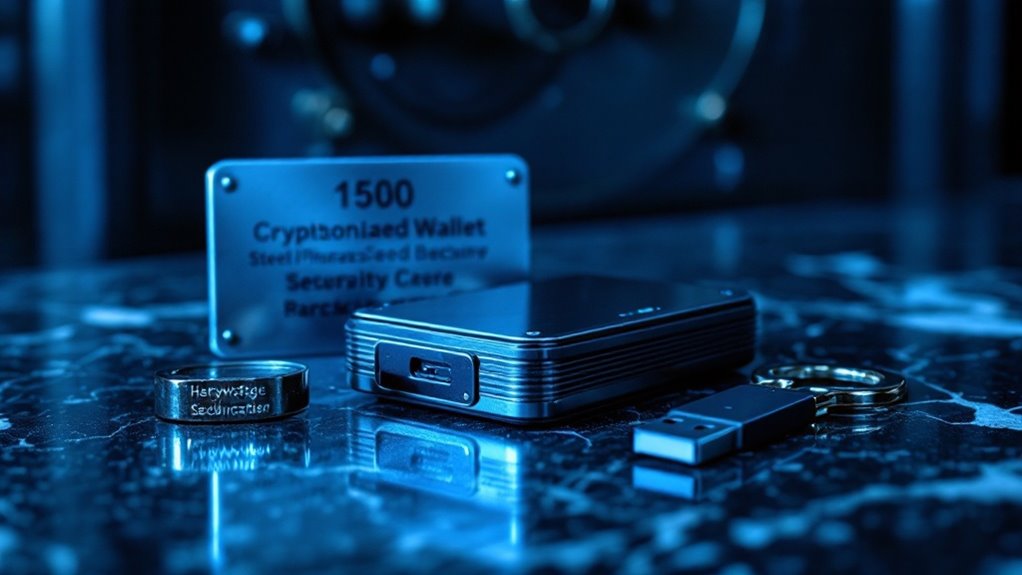Securing cryptocurrency requires a layered approach, like protecting precious gems in a high-tech vault. Hardware wallets serve as digital fortresses, while encrypted backups add flexibility through cloud storage and external devices. Physical methods, including fireproof safes and metal plates, guard against environmental threats. Advanced solutions like multi-signature wallets and Shamir's Secret Sharing distribute responsibility among trusted parties. This blend of traditional and cutting-edge protection reveals the evolving landscape of crypto security.

As cryptocurrency adoption continues to grow, the critical task of securing digital assets has become paramount for investors and enthusiasts alike. Like precious gems locked away in a vault, cryptocurrency private keys require robust protection through various backup methods, each offering distinct advantages and tradeoffs in the eternal balance between security and convenience.
Hardware wallets stand as the digital equivalent of a fortress, keeping private keys tucked safely away from the prying eyes of malware and viruses. These specialized devices, though requiring an initial investment, provide peace of mind through their ability to support multiple cryptocurrencies while maintaining an air-gapped defense against online threats. Vault12's quantum encryption offers an additional layer of protection for hardware wallet backups, ensuring future-proof security against emerging threats. Two-factor authentication adds a crucial security layer to protect against unauthorized access.
Yet even the sturdiest castle can fall, and hardware wallets remain vulnerable to physical damage or loss. Experts recommend storing recovery phrases in fireproof safes to ensure long-term protection against catastrophic events.
For those who appreciate simplicity, paper wallets offer an elegantly straightforward solution, like a treasure map carefully hidden away. However, paper's fragile nature demands meticulous protection from the elements, while metal backups emerge as paper's more resilient cousin, standing strong against fire and water like ancient artifacts preserved through time.
The digital domain offers its own set of solutions, with encrypted files stored on external devices providing the flexibility of multiple copies scattered like seeds in different locations. Cloud storage takes this concept skyward, offering worldwide accessibility, though this convenience comes tethered to the eternal question of trust in service providers and the strength of encryption protocols.
Modern innovation has given rise to more sophisticated approaches, with multi-signature wallets requiring a digital council of approvals before releasing funds. This distributed responsibility finds its mathematical evolution in Shamir's Secret Sharing, where a seed phrase splits into fragments like pieces of an ancient scroll, each meaningless alone but powerful when combined in sufficient numbers.
These backup methods form a tapestry of security options, each thread offering unique properties in the complex weave of digital asset protection. The wise cryptocurrency holder often employs multiple approaches, creating a redundant safety net that catches what single solutions might miss, much like a chess master planning several moves ahead.
Frequently Asked Questions
How Often Should I Update My Crypto Wallet Backup?
Cryptocurrency wallet backups typically don't require frequent updates due to HD technology. Users should verify backups quarterly and update only when changing wallet settings, adding new currencies, or modifying security features.
Can I Store Multiple Wallet Backups in the Same Physical Location?
While possible to store multiple backups in one location, it increases risk exposure. Security experts recommend distributing backups across different secure locations to protect against catastrophic events and minimize potential losses.
What Happens to My Crypto if My Hardware Wallet Manufacturer Goes Bankrupt?
Cryptocurrency remains secure and accessible since it exists on the blockchain, not the hardware wallet. Users can recover their assets using their 24-word seed phrase with any compatible wallet, regardless of manufacturer's status.
Should I Tell My Family Members Where I Store My Wallet Backup?
Sharing complete backup location details with family poses significant security risks. A better approach involves providing partial information to trusted members while storing remaining details through secure, separate channels for emergency access.
Are Paper Wallets Still Considered a Secure Backup Method in 2024?
Paper wallets remain technically secure if generated properly offline, but are no longer recommended due to physical vulnerabilities and superior alternatives. Hardware wallets provide better security with comparable offline protection in 2024.









